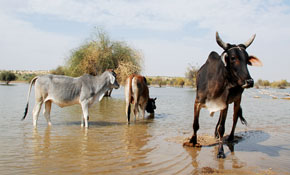Unconventional water resources
Increasing water scarcity is recognized as a key challenge to sustainable development and major cause of conflict, social unrest and changes to traditional migration routes and new migration patterns.
Increasing water scarcity is recognized as a key challenge to sustainable development and major cause of conflict, social unrest and changes to traditional migration routes and new migration patterns.

DMRC officials also told the court that six stations — Tagore Garden, Welcome, Botanical Garden, Karkardooma, Anand Vihar and Dhaula Kuan —had rainwater harvesting structures, but they were not functional.

Mukhya Mantri Jal Swavlamban Abhiyan (MJSA), described as the country's largest campaign of its kind towards water harvesting and conservation in rural areas, was launched by Chief Minister Vasundhara
The ruling alliance’s flagship rural employment programme took unprecedented strides in creating water conservation structures across the country, but only to harvest disillusionment. What went wrong?

<p>Down To Earth finds out how once-parched and barren district of Rajasthan, Barmer now sees development all around, thanks to the flood and rains.</p>
<p>Poor access to appropriate technologies due to difficult topographies and tough mountain conditions is one of the major causes of poverty, drudgery and natural resources degradation not only in the Indian Central Himalaya, but also in other parts of the Hindu-Kush Himalaya. Of late, deve-</p>
<p>Excess fluoride in groundwater-based drinking water supply is a growing concern in semi-arid tropical (SAT) regions of India. More than 16 states in India are facing the fluorosis problem. Several southern-peninsular states are experiencing monsoon climate condition, where the rainwater is harvested through tanks and used for agriculture.
<p>One of the major planks of rapid poverty reduction in the Eleventh Five Year Plan is the successful implementation of National Rural Employment Guarantee Act (NREGA) in majority of the states of India.
<p>The National Rural Employment Guarantee Scheme (NREGS) came into existence after the enactment of the Parliament Act 'National Rural Employment Guarantee Act' (2005) in September 2005. The primary objective of the scheme is to provide 100 days of guaranteed wage employment in a financial year to every household whose adult members volunteer to do unskilled manual work.
<p>A check-dam in coastal Gujarat sweetened water and changed farmers' lives. Now, another change is coming, a cement factory over the reservoir and the villagers are on the warpath.</p>